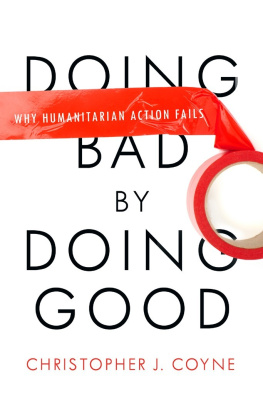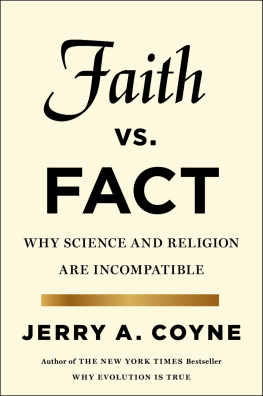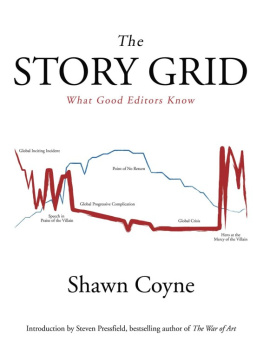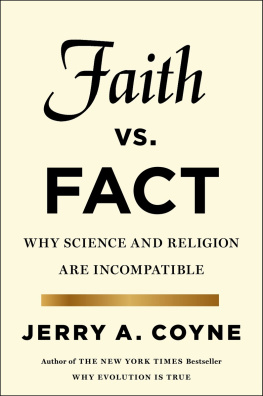Stanford University Press
Stanford, California
2013 by the Board of Trustees of the Leland Stanford Junior University. All rights reserved.
No part of this book may be reproduced or transmitted in any form or by any means, electronic or mechanical, including photocopying and recording, or in any information storage or retrieval system without the prior written permission of Stanford University Press.
Special discounts for bulk quantities of Stanford Economics and Finance are available to corporations, professional associations, and other organizations. For details and discount information, contact the special sales department of Stanford University Press.
Tel: (650) 736-1782, Fax: (650) 736-1784
Printed in the United States of America on acid-free, archival-quality paper
Library of Congress Cataloging-in-Publication Data
Coyne, Christopher J., author.
Doing bad by doing good : why humanitarian action fails / Christopher J. Coyne.
pages cm
Includes bibliographical references and index.
ISBN 978-0-8047-7227-3 (cloth : alk. paper)ISBN 978-0-8047-7228-0 (pbk. : alk. paper) 1. Humanitarian assistanceEconomic aspects. 2. Humanitarian interventionEconomic aspects. 3. Economic assistance. I. Title. HV553.c698 2013
361.2dc23 2012046254
ISBN 978-0-8047-8611-9 (electronic)
Typeset by Classic Typography in 10.75/15 Sabon MT Pro
D OING BAD BY DOING GOOD
WHY HUMANITARIAN ACTION FAILS
Christopher J. Coyne
STANFORD ECONOMICS AND FINANCE
An Imprint of Stanford University Press
Stanford, California
To Charlotte
Leave the world a better place than you found it
Acknowledgments
THIS BOOK IS SEVERAL years in the making, and its development has benefited from useful discussion with, and comments from, Pete Boettke, Art Carden, Tyler Cowen, Pete Leeson, Jayme Lemke, Adam Pellillo, Ben Powell, Bill Shughart, Virgil Storr, and Claudia Williamson. I would also like to thank my editor at Stanford University Press, Margo Beth Fleming, for her support, friendship, and guidance throughout this project.
Parts of this book were presented at the Social Philosophy and Policy Center at Bowling Green State University (summer 2010); The Colloquium on Market Institutions & Economic Processes at New York University (fall 2010); and the Students for Liberty Webinar Series (spring 2012). I am grateful to organizers and to the participants for their comments and suggestions.
This book would not be possible without the generous support of several individuals and organizations. I would like to acknowledge the support of the Social Philosophy and Policy Center at Bowling Green State University, where I was a visiting scholar during the summer of 2010. Special thanks to Fred Miller, Ellen Paul, and Jeff Paul for arranging my visit and for creating an intellectually exciting environment during my time at Bowling Green. The Earhart Foundation and Kaplan Fund provided financial support during the summer of 2011 that allowed me to focus exclusively on this project. I am also grateful for the support provided by the F. A. Hayek Program for the Advanced Study in Philosophy, Politics, and Economics at the Mercatus Center at George Mason University.
Finally, I would like to thank my wife, Rachel, both for her support throughout this project and especially for reading and commenting on several earlier versions of the manuscript.
We have sunk to such a depth that the restatement of the obvious has become the first duty of intelligent men.
GEORGE ORWELL, 1939
The fact that I have no remedy for all of the sorrows of the world is no reason for my accepting yours. It simply supports the strong probability that yours is a fake.
H. L. MENCKEN, 1956
The recognition of the insuperable limits to his knowledge ought indeed to teach the student of society a lesson of humility which should guard him against becoming an accomplice in mens fatal striving to control societya striving which makes him not only a tyrant over his fellows, but which may well make him the destroyer of a civilization which no brain has designed but which has grown from the free efforts of millions of individuals.
F. A. HAYEK, 1974
Contents
Preface
DOING BAD BY DOING GOOD builds on my previous book, After War: The Political Economy of Exporting Democracy. The purpose of Doing Bad by Doing Good is to pick up where After War left off by exploring the economics of state-led humanitarianism. The topics in the two books are clearly related, especially as humanitarian action has over time become increasingly intertwined with the broader military and foreign policy objectives of governments. Therefore, the two books should be read as complements for a broad understanding of the viability of state-led foreign interventions.
I should provide a few caveats so as not to mislead the reader. For those looking for either a how to guide for carrying out humanitarian action or steadfast rules of when governments should, or should not, assist others, this is not the book for you. Instead, the purpose of this book is to explore the ability of governments to assist those in need. Many discussions of state-led humanitarian action, especially those by politicians, focus on the moral responsibilities of governments to proactively aid those who are perceived to be in need. Consider, for example, the following from President John F. Kennedy in 1961: [T]here is no escaping our obligations: our moral obligations as a wise leader and good neighbor in the interdependent community of free nationsour economic obligations as the wealthiest people in a world of largely poor people... and our political obligations as the single largest counter to the adversaries of freedom.
However, in focusing on the normative aspects of the issuewhat governments ought to dothe positive aspectswhat can be doneof state-led humanitarian action are often neglected. This is unfortunate, since understanding the feasibility of humanitarian action, as well as its limits, in practice ultimately requires positive analysis. Indeed, once we consider the relevant constraints and incentives at work it may turn out that governments lack the ability to actually deliver on what are determined to be their moral obligations. So while economics cannot provide normative answers regarding the moral responsibility to help others, it can provide crucial insights into whether state-led humanitarian action can succeed and, perhaps more important, avoid causing unintended harms to those in need. These insights can then inform subsequent moral discussions because unrealistic oughts can result not just in frustration, but worse yet in the very opposite of what was intended. When this happens, obligations that initially may appear to have moral weight actually do not. In this regard, my hope is that the analysis that follows can contribute to our understanding of humanitarianism by delineating the limits of state-led humanitarian action to remove suffering and improve the human condition.
INT RODUCTION
A Living Example of the Puzzle
MILITARY FORCES FROM the United States, NATO, and Afghanistan in 2010 began Operation Moshtarak, a major military offensive in Marja. Marja is located in the Helmand Province in southern Afghanistan, a major poppy growing region and a Taliban stronghold. In addition to driving out the Taliban, military forces also intended to provide humanitarian assistance, both immediate assistance and long-term development aid, to civilians in the area. The aim was to ensure that basic needs were met right away while simultaneously creating the basic conditions for reconstruction and growth in Marja. Many, however, were unaware that this was not the first time that such an effort had been undertaken.
Next page









